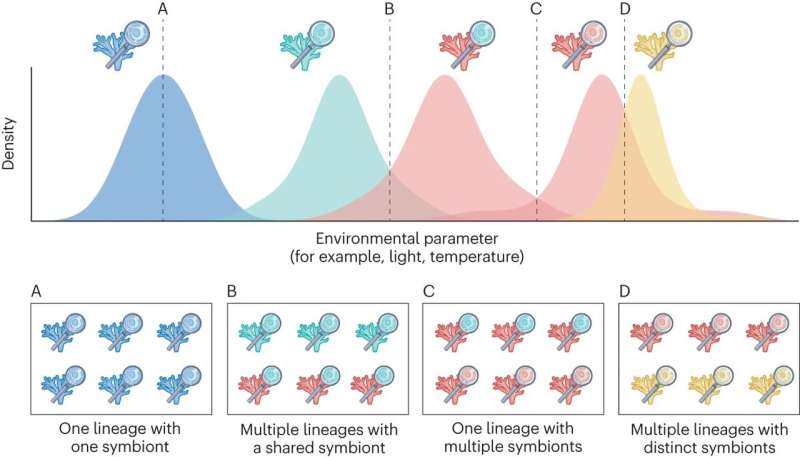This article has been reviewed according to Science X's editorial process and policies. Editors have highlighted the following attributes while ensuring the content's credibility:
fact-checked
peer-reviewed publication
trusted source
proofread
Discovery of widespread coral diversity may change conservation efforts

There may be many more species of coral than we ever imagined—according to researchers from Boston University, The University of Rhode Island (URI), and Woods Hole Oceanographic Institute (WHOI)—and they may change our approach to coral reef conservation and restoration efforts around the globe.
Assistant Professor of Biology Sarah W. Davies, along with postdocs Carsten G. B. Grupstra and Hannah E. Aichelman, James Fifer, and a team of researchers from URI and WHOI say they have found evidence of at least 24 examples around the world where coral with similar appearances live on the same reef, but have different DNA.
Importantly, they say, some of the coral with "cryptic lineages"—structurally similar but genetically distinct—may be able to withstand higher water temperatures—and thus have better survival rates in warming waters. That has important implications as scientists work to conserve and restore coral reefs in light of climate change.
"This changes the game. It changes the way that we think about our systems. It changes the way we think about coral adaptation and conservation," said Davies, who has studied cryptic coral in the Caribbean and in the waters off Palau, an island country in the western Pacific. "It puts a pause on what we actually do know and opens up a Pandora's box."
The researchers published their findings in a February 13 perspective in Nature Ecology & Evolution entitled, "Integrating cryptic diversity into coral evolution, symbiosis and conservation."
Corals are animals that have algae and communities of bacteria living within their cells. Tropical corals depend on the photosynthesis performed by algae for their nutrients. When temperatures get too high, photosynthesis is interrupted. The corals may then expel the algae, or the algae die, and the corals lose their main means of obtaining nutrients. This loss of algae and nutrients causes the corals to turn white—known as bleaching—and the coral may start to die.
When scientists look at thermal tolerance in response to climate change, they examine the coral, the algae, and the bacteria. Often, cryptic lineages have different types of algae and bacteria, and those algae and bacteria may respond differently to warming waters. New DNA sequencing efforts in Davies' lab and others have uncovered widespread evidence of "cryptic lineages" that may have otherwise been ignored.
"We find this cryptical coral diversity on reefs all over the world, and we find when we can compare how these corals do under a climate change stressor, we find that they tend to respond differently," Aichelman said. "We think it has big implications for how we think about biodiversity on reefs and the difference that exists on reefs that could occur as a result of climate change."
As part of efforts to stem climate change, restoration projects are underway to take coral from one area of the ocean and move it to another. With this new discovery, Davies and her colleagues worry that conservation efforts may be mistaking different types of coral as the same due to their appearance and thus not saving certain lineages of the species.
"It's not that people were missing it; they were misinterpreting what the pattern means," Davies said. "There's a lot of genetic variation that we're just beginning to discover. The presence of so much diversity is exciting, but at the same time, we could be losing species we didn't even know we had. That's the scary part."
Scientists still don't understand why these cryptic lineages exist, or where they came from, but they know they might hold another key to combat climate change. The next step for the researchers is to find tools to better identify the cryptics in the field without DNA sequences—one that coral reef conservation and restoration workers could use as they work in the field.
"We need to do a lot more work looking at these cryptic corals," Grupstra said. "By studying coral, we can learn a lot about ourselves and our environment and other animals. They're such fragile organisms, and yet they've been so successful. They create fantastic ecosystems that have survived for so long. It's built on this whole building block of these tiny animals. And we can't ignore the diversity."
More information: Carsten G. B. Grupstra et al, Integrating cryptic diversity into coral evolution, symbiosis and conservation, Nature Ecology & Evolution (2024). DOI: 10.1038/s41559-023-02319-y
Journal information: Nature Ecology & Evolution
Provided by Boston University





















